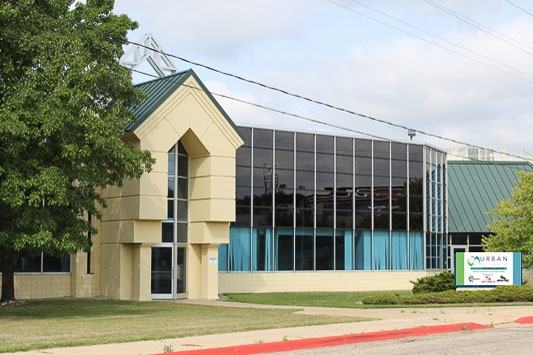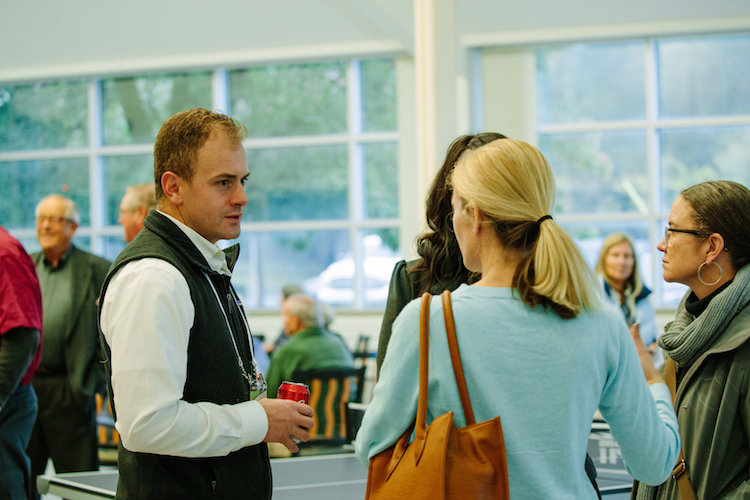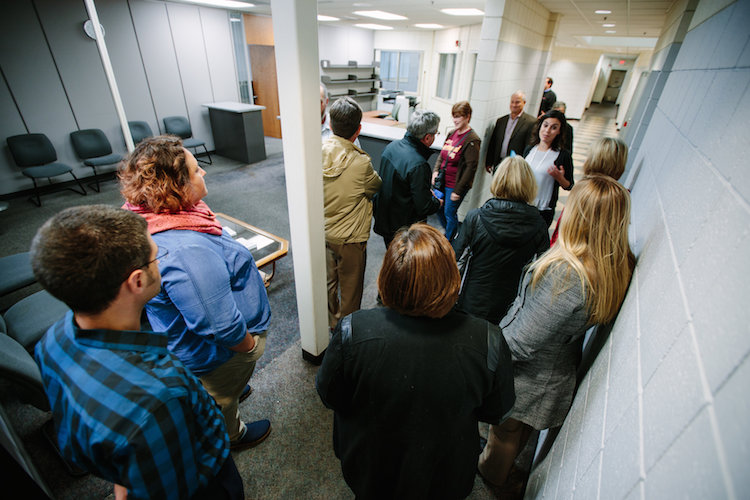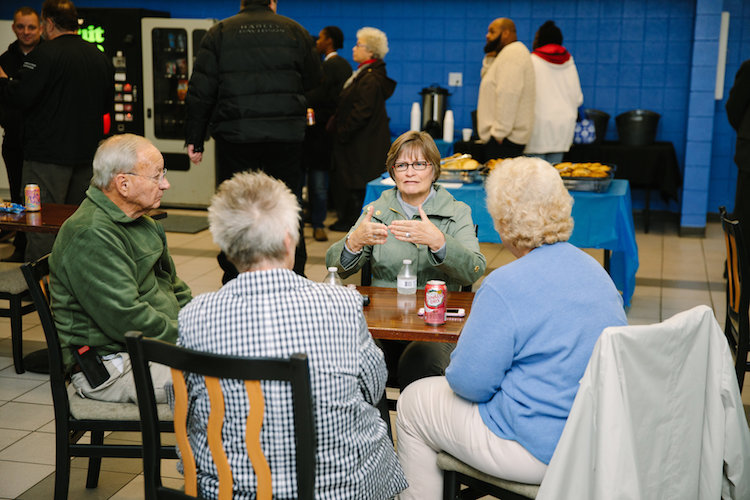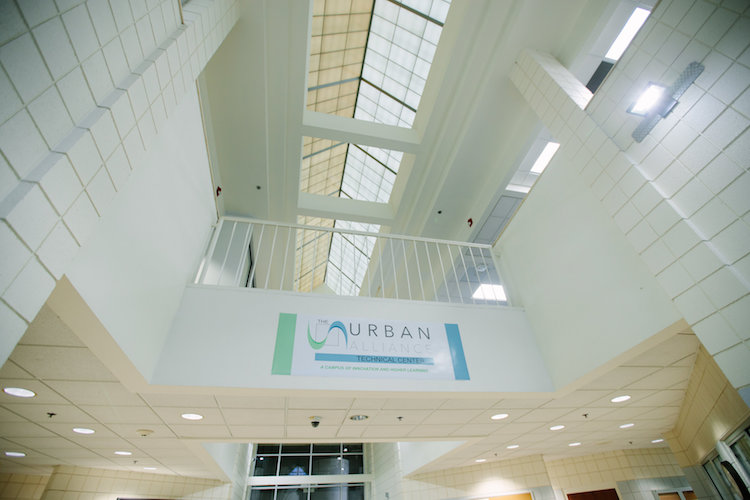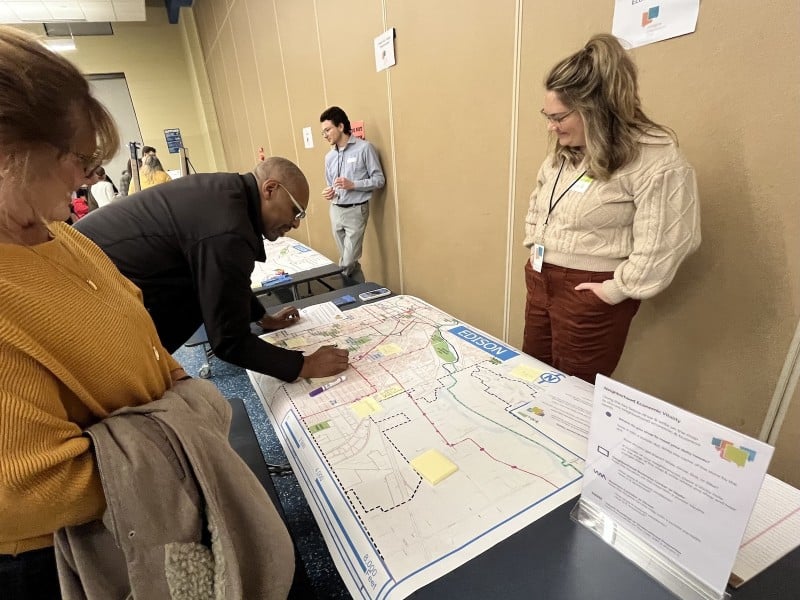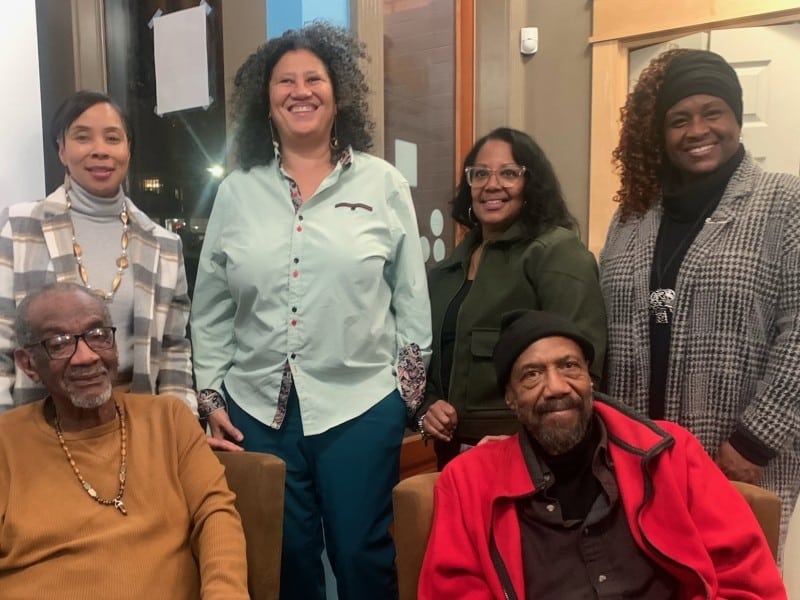Momentum employment program picks up momentum of its own with new tech center
How does Momentum get so many people into jobs and keep them there?
From homelessness to holding down a job — that is the kind of transformation that people who go through the Momentum program can experience.
Brian Parsons is director of Urban Alliance’s Momentum, a wildly successful employment program for some of the community’s most marginalized job seekers that has placed 150 people in jobs in the past four years and 82 percent of them have kept those jobs for more than 90 days.
“National statistics show that if you make it past 90 days, you tend to stay, and we’re finding that to be true,” Parsons says. “We’ve had some really high success rates beyond that first 90 days. To my knowledge, Momentum is the only program of its type in the country that is turning out the success rate that we are.”
He remembers one Momentum participant who was living in his car with his wife and children when he joined the program. After completing the Momentum program he went through a CNC operators’ program and was hired at Bowers Manufacturing Co.
“He’s been working there for almost a year now,” Parsons says. “And since then he’s gotten a new car. He’s gotten his own place to live. He’s renting right now, and doing fantastic. He’s been promoted twice within that year.”
This kind of story is the not the exception but the rule for the Kalamazoo-based Momentum program, where the placement rate for participants seeking jobs is 93 percent, in part because participants are trained specifically in jobs for which a network of 53 local employers have said they need workers.
Equally important, participants are supported by services tailored to help them succeed. Transportation, food pantry assistance, housing, and interview clothes provided by local clothing closets are some of the services participants receive.
That’s possible because a cornerstone of the program is its small class size. “We’re not just running a bunch of people through a program,” Parson says. “It’s really about getting to know each person.”
This intensive case management is necessary since those in the program have to overcome many barriers to finding and keeping a job. Some have criminal records, others have very limited job experience.
“Whatever the barriers might be for an individual, that’s what their program is geared toward. And so it’s about getting in, and digging in, and helping them really overcome those barriers.
“Housing is a huge need,” Parsons says. “If you have any kind of criminal background it’s almost impossible to find affordable housing that’s in good condition in a decent location. So that’s something that we’ve worked on really hard to develop partnerships (with people who can offer affordable housing). And we’re still working on that. That’s something that is still very much a work in progress.”
Program participants also can get help with their interactions with agencies such as the Department of Health and Human Services, Kalamazoo Community Mental Health or parole and probation offices. “Those type of services sometimes can be complicated,” Parsons says, “so we help them navigate those so they get the assistance that they need.”
If you listen to those who have been through the Momentum program they also say they get a sense of family that some of them have never experienced.
“We’re doing all kinds of supports to help them along the way to get them up to a place where they’re going to be able to stand on their own,” Parsons says. “But at the same time, we do hold them at a very high level of commitment. So they are proving themselves through the process.”
Participants are paired with a mentor and go through a six-week employment program where they develop employability skills and life skills. During this process they also demonstrate they are committed to turning around their lives.
“We believe that we’re in a perfect situation where we’re able to provide a service to individuals who are serious about making change and we’re able to supply a community need — skilled workers who are hungry and ready to just dive in and do everything they can to be successful,” Parsons says.
By meeting requirements such as never missing a class — Momentum has a zero-tolerance attendance policy — would-be workers prove themselves to Momentum staff and prospective employers.
“Our employers know when they get a graduate they get somebody who has been able to toe the line for six weeks,” Parsons says. “So it becomes an easy transition for them because it’s like they’ve already proven they can do it.”
For those who go on to an academy there is an even deeper commitment required. They spend eight hours a day in a classroom for three weeks. “It’s something that I would find difficult — and they’re knocking it out,” Parsons says. “They’re excited about it.”
Those who participate in the program are those who want to work, “they just need some training and some assistance in getting them in front of the right people who will recognize their talents,” he says.
There’s another benefit to going through the Momentum program. “Once you’re a Momentum graduate, you’re always a Momentum graduate,” Parsons says. “So if you ever need any assistance you can always come back and we’re always here to assist you.
“We’ve had people who’ve been employed for two years, and even three years, who have come back and said, ‘You know what? I’ve moved up as far as I can move up in this company. I think I’m ready to advance into something else. Can you find me something else?’ And then we work with them to find something else. And then, not only find something else and help them leave that employer right. And then we can backfill their (the employer’s) need with a new employee.”
Looking forward
After a year of planning, the Momentum program began 2014 in the Edison neighborhood. It added a second location at New Village Park in the Eastside neighborhood. Recently, it added a location at the Douglass Community Center in the Northside neighborhood. Now classes meet in Edison and alternate between the Northside and Eastside. But in 2018 all three locations will operate simultaneously.
Soon, the program will have the ability to serve even more job seekers. A partnership between the transportation and warehouse company L.C. Howard Inc., Western Michigan University, Kalamazoo Valley Community College, and Urban Alliance is opening the Urban Alliance Technical Center at 400 Island Avenue, off Riverview Drive in Parchment, in early 2018.
The partners are in the process of raising $2.4 million for the tech center, with about $2 million to go. The center is being opened in phases as funds become available. “We have completed Phase One, which is basically the classroom areas, as well as administrative wings,” Parsons says.
A small section of the warehouse area will be completed next. A warehouse management and inventory control academy begins Dec. 4. “We’ll be phasing in additional academies as additional funding comes in.”
About 300 people turned out for a recent open house to see the home of the new tech center. The first academy there already has 20 students enrolled the new 40,000-square-foot technical center.
All the academies are developed around an experiential model that is 50 percent classroom instruction and 50 percent hands-on learning.
Academies previously offered in partnership with KVCC include a Production Technician Academy, CNC Machine Operator’s Academy, and Culinary Academy.
In the works are Warehouse Management and Inventory Control academies offered in partnership with WMU and KVCC. Future academies in development are Quality Control, Coding, Call Center Technician, and Diesel Technician.
All academies are developed in conjunction with local employers’ needs and the job’s potential for providing a living wage.
“We don’t place anyone in minimum wage jobs,” Parsons says. “Everything that we’re doing is trying to get people self-sustainable.” So graduates are placed in jobs that on average start at about $12 an hour.
“The fact that we’ve been able to get four entities with completely different backgrounds to work together on this has been pretty amazing,” Parsons says. “It’s amazing what can happen when people do decide to work together for the right reason.”
Though many jobs programs rely on federal government funding, Momentum has no intention of going that route because they believe it would fundamentally change how they are required to run the program.
“We believe we’ve started something that is transforming,” Parson says, “and we don’t want anybody to mess with that.”
Kathy Jennings is the managing editor of Southwest Michigan’s Second Wave. She is a freelance writer and editor.

